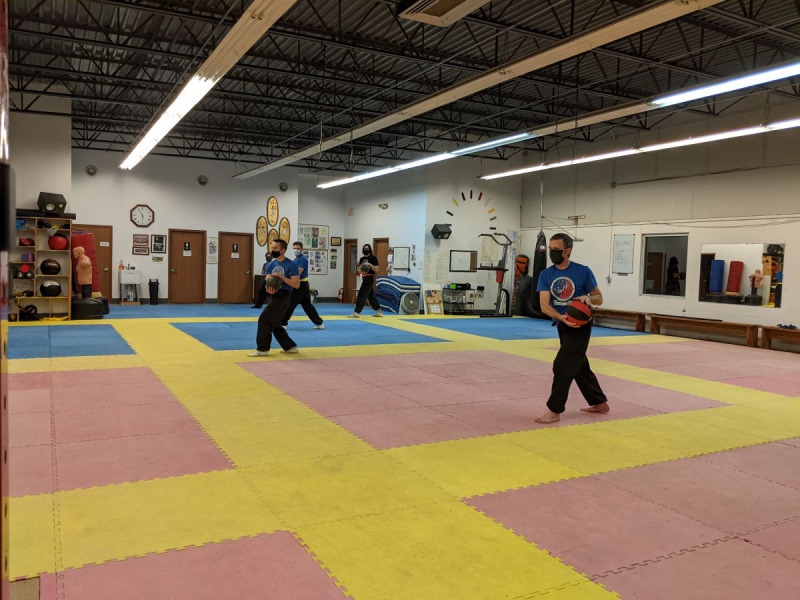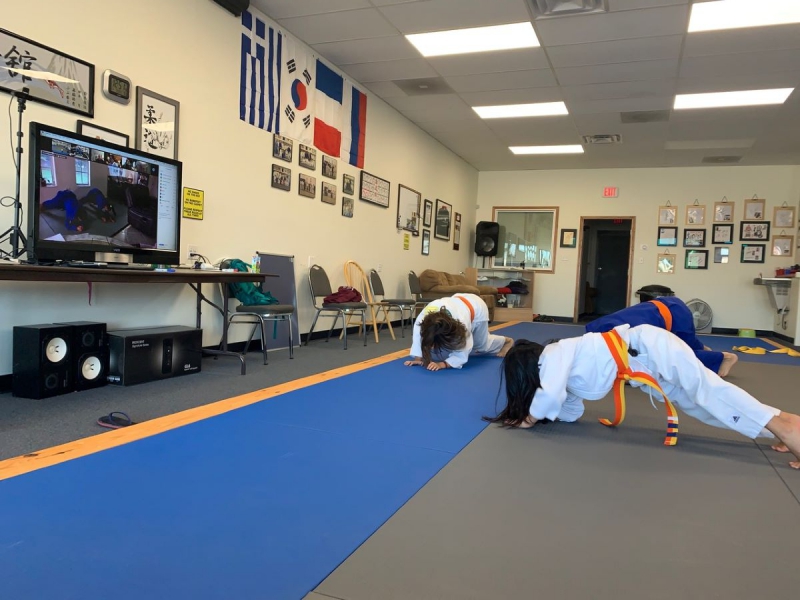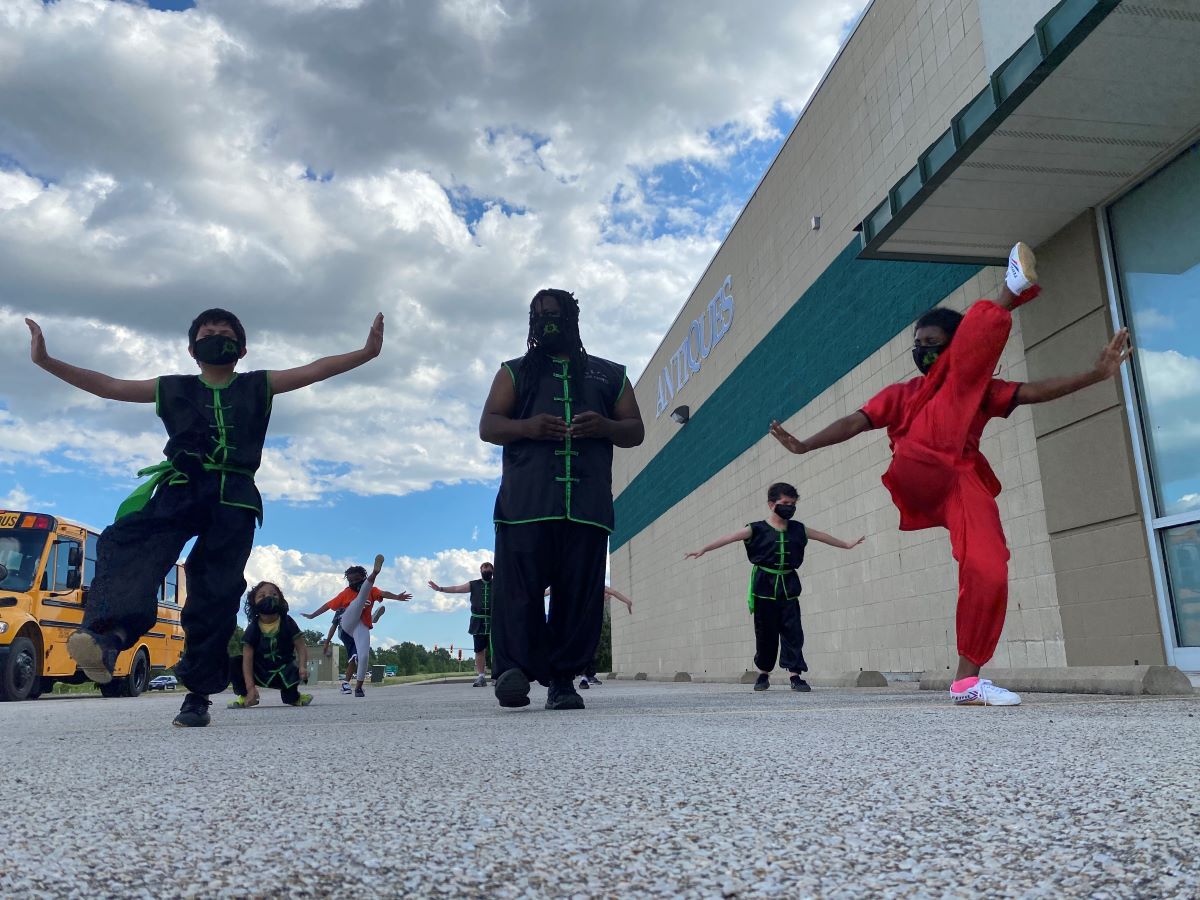*Editor’s note: This article was written before Tier 3 mitigations went into effect for our region.
I’m a self-professed martial arts junkie. Some years ago, I went to check out a martial arts school for my then kindergartener and something latent lit up inside me; I enrolled instead. It was a time when I was struggling in many ways and the practice helped me grow immensely, both physically and emotionally. It brought me back to myself and gave me the kind of energy I needed to handle the challenges that came my way. Now, I cannot imagine my life without it. I’m hooked.
Like many things, martial arts training looks quite different this year because of the pandemic. The physical distancing and infection control measures have been particularly challenging because martial arts usually requires some degree of contact between practitioners – and yet, this is a time when the empowerment that comes with the practices feels more important than ever.
I have been wondering how martial arts schools, especially those that rely on contact-based partnered work, have been navigating this time and continuing to serve and empower their students. I reached out to some of the schools in and around Champaign-Urbana. Here’s what they had to say:

Photo by Tias Paul.
David Ward at Song’s Kung Fu Academy
“Martial arts teaches dedication, discipline, and perseverance as cornerstones of success. All of these skills are critical in coping with the pandemic, whether staying safe at home and in daily life, or continuing to pursue personal interests like the martial arts. The pandemic can also make people feel isolated, both physically and spiritually. Continuing to have a regular schedule of classes provides students with the opportunity to feel like part of a community, and can help alleviate the anxiety that comes with our shared circumstances.
“Our school has adapted to the pandemic in a few significant ways: we’ve eliminated contact drills and sparring; conducted classes outdoors whenever possible, and always socially distanced; and changed parts of the curriculum to emphasize more individual techniques. Finally, we provided Zoom-based teaching options early on to try and keep our group together. Online teaching for martial arts is particularly challenging for students in apartments or with limited physical space to move and practice, but we’ve tried to be flexible and adjust our program to keep everyone engaged and active.”
Demitri Daniels at Jade Fortress Martial Arts
“Amituofo!!! Jade Fortress is a Shaolin martial arts cultural center located in Savoy. The basis of Shaolin gongfu (kungfu) training is in Chan Buddhism. One of the key points in Buddhism is the belief that life is filled with suffering, but there is a way to overcome that hardship. Things have changed so much because of COVID-19 but subjecting yourself to hardship little by little allows you to make it through it. Aside from the minor inconvenience of the amount of students able to train at once indoors and wearing a face mask, our staff and students have not been really affected. In fact, it has helped us to better learn to cope with things and control ourselves, focusing on breathing and acceptance.”

Photo by Grace Talusan.
Grace Talusan at Kokushi Midwest Judo
“I’ve trained judo for 15 years, and what I loved about it was that it always taught you to get up when you fall down. Judo (as well as other martial arts) encourages discipline and to always find the best way to solve a problem. Before the pandemic, I would train 5-6 nights a week, go to weekend tournaments/training camps and would be in a perpetual state of soreness. I was constantly training my body to push through the pain to get to the end goal. Now that we are in the midst of this health crisis, the intense physical training of judo is gone, but now I’ve been forced to adapt and have found that the mental training of judo is equally as demanding as the physical. There are days when you see the numbers of COVID cases rising and you feel that there is no end in sight, but there is… and judo has taught me to keep going… find alternative ways to train, and most importantly to stay positive because we will be back on the mats again.
“Judo is a full-contact sport, and during our shutdown, I had to come up with a plan in order to teach judo without touching anyone. We’ve lost over 50% of our students because we have people on both sides of the fence — they either aren’t comfortable being near people just yet OR they don’t want to do judo unless it’s full contact. With the students that have stayed (mostly kids), we are in a strict non-contact classes and limit the number of people on the mat. The kids are happy just to be able to socialize with each other, and I think that’s most important during these times. Unfortunately, my adult program is on-hold for the time being.
“We’ve come up with quite a few solutions [for classes].
- We are offering Zoom classes to all of our students. We put in more classes so that we can have smaller numbers on the mat but still give everyone the same amount of days to train.
- Maximum of 7 people on the mat with minimum 10 ft between everyone (unless you are in the same family). I am strictly no-contact because I understand the concerns of our families — so even if one family is uncomfortable with gripping someone else, then we will maintain that way of operation until the health pandemic is gone. We are a family here, and we are all in this together.
- We have switched our focus to judo movements, falling, rolling, strength and conditioning…We’ve concentrated on our fundamental skills (foot placement, arm motions and balance), so that when we go back to full-contact, the fundamentals will be there and it will be easier for them to execute the techniques. he kids are all smiles when they leave — I’m looking forward to their future.
- We also run monthly Zoom clinics where class is taught by former Olympic champions. We’ve done this for several months now and the kids’ faces light up when they see the judo superstars doing pushups and burpees alongside them. The kids are also getting a bit of a geography lesson, because some of the Olympians have taught directly from their dojos in Japan, United Kingdom, Brazil and even Uzbekistan.”
Namsoo Hyong of HMD Academy of Tae Kwon Do
“I had thought about Zoom training many times but I didn’t implement it so I thought this is the time that I need to adapt to online training. I started talking to the instructors to download Zoom and get familiar to it. The middle of March when it was shutting down, we were ready to move into Zoom from the in-person training. That was the biggest change. We were offering not only group training but also individualized lessons online.
“In July we reopened… and now we have almost 60 people who are coming for in-person training. Approximately 25% of members are attending in-person, 45% are online, and the rest of members are waiting for it to get better and safer. For in person training, we are following the CDC and State of Illinois guidelines. We never missed any single day:
- Anyone who has any symptoms, do not come
- When entering the academy, they have to check temperature and sanitize their hands, and wear masks
- When class is over, we spray disinfectant in the air and the floor
- We made an entry and exit
- During the summer we opened the windows and doors
“All my students have been very, very cooperative, it’s incredible. I thought the discipline that I have taught to my students is showing during this difficult time. Everybody did a wonderful job. I didn’t hear any sad news from my students at all; I am very happy.
“Most importantly, we have a group of instructors who are very motivated, willing to help the students overcoming difficulties. Actually, people who are staying home right now, they can have a lot of issues — stress, frustration, anxiety and all these things — and I think martial arts can get into each house and we are able to work out and relieve the stress and anxiety so they can have more hope to get over this difficult time.
“In the meantime, I have changed mental training quite a bit, compared to before. I am emphasizing:
- Pay attention to the CDC guidelines, Illinois guidelines and scientists warning
- Use the discipline that we have developed, follow the instructions
- Care, pay attention to you, your needs, your wants
- Continuously motivate that feeling in yourself, in spirit…if and when you make a mistake, don’t worry, start again.”








